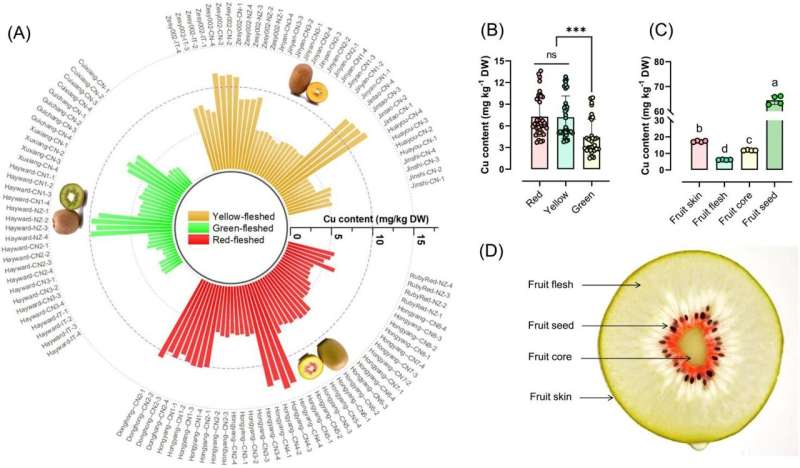
Copper concentrations in major kiwifruit cultivars around the world. Credit: Liu Xiaoying
Kiwifruit is a popular, commercially available fruit packed with nutrients. Over the last decade, the cultivation of kiwifruit has been plagued by a severe epidemic caused by Pseudomonas syringae pv. actinidiae (Psa).
Copper (Cu) -based fertilizers and pesticides are widely used to fight against Psa, which in turn increases the accumulation of Cu in kiwifruit, threatening food safety and human health.
Researchers from the Wuhan Botanical Garden of the Chinese Academy of Sciences have revealed that ascorbic acid (AsA) could enhance the Cu tolerance and mitigate Cu toxicity in kiwifruit.
Ascorbic acid (AsA), commonly known as vitamin C, has a range of functions involving the detoxification of reactive oxygen species and maintaining plant growth and human health.
The study was published in Journal of Hazardous Materials.
In the study, the researchers assessed the Cu content of 108 kiwifruit samples of 27 cultivars worldwide. They found that the average Cu content of kiwifruit with red- or yellow-fleshed was significantly higher than that of green-fleshed, and the Cu content level in fruit flesh and cores was significantly lower than that in fruit skin and seeds.
High concentration of Cu resulted in obvious damage in the kiwifruit plants, which was mitigated when the kiwifruit plants were feeding with exogenous AsA.
The researchers found that Cu treatment for 12 h increased the AsA content in kiwifruit leaves and up-regulated key genes involved in AsA biosynthesis, such as GDP-L-galactose phosphorylase3 (GGP3) and GDP-mannose-3′,5′-epimerase (GME).
Overexpressing GGP3 in transgenic kiwifruit increased the endogenous AsA content of kiwifruit. Increased AsA content in transgenic lines could mitigate Cu toxicity, result in mitigated Cu stress inhibition of photosynthesis, scavenge excess ROS, and alter stress-related gene expression of kiwifruit under Cu treatment. The transgenic kiwifruit had higher AsA content (8.4- to 12.2-fold) than that of wild-type.
More information:
Xiaoying Liu et al, Increased ascorbic acid synthesis by overexpression of AcGGP3 ameliorates copper toxicity in kiwifruit, Journal of Hazardous Materials (2023). DOI: 10.1016/j.jhazmat.2023.132393
Citation:
Increased vitamin C may mitigate copper toxicity in kiwifruit (2023, October 19)
retrieved 19 October 2023
from https://phys.org/news/2023-10-vitamin-mitigate-copper-toxicity-kiwifruit.html
This document is subject to copyright. Apart from any fair dealing for the purpose of private study or research, no
part may be reproduced without the written permission. The content is provided for information purposes only.
>>> Read full article>>>
Copyright for syndicated content belongs to the linked Source : Phys.org – https://phys.org/news/2023-10-vitamin-mitigate-copper-toxicity-kiwifruit.html
